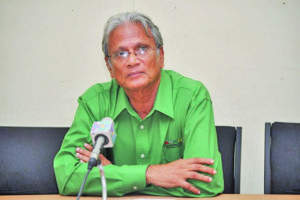
– calls Budget 2019 a “generous” one
The latest supporter of the 2019 Budget has turned out to be Public Service Minister and the Working People’s Alliance (WPA) only representative in the Cabinet, Dr Rupert Roopnaraine.
WPA is one of several smaller parties that comprise A Partnership for National Unity (APNU). While WPA executive and political activist Dr David Hinds has been critical of some of the budget’s shortcomings, Roopnaraine made no mention of any of this during his speech on the first day of budget debates.
Instead, Roopnaraine has said the budget makes a case for the coalition Government’s worthiness as leaders. He used glowing epithets to laud the budget, which he noted would contribute to Guyana’s proverbial “El Dorado”.
According to the Minister, the budget is a “generous” one, and contains several positive measures. Here he revealed that a number of scholarship opportunities will be given priority in oil and gas-related areas that include petroleum data management.
“One of the primary innovations that this administration has brought to transforming public service management is the introduction of a Planning and Analysis Unit. The purpose of this unit is to provide evidence-based oversight for the service offered to Guyanese, and ensuring there is value for money in the distribution of scholarships,” he said.
He noted that the unit has a priority subject area formula it works with when scholarships are distributed. He noted that the United Kingdom is Guyana’s primary international partner for such training opportunities, particularly in the Master’s degree level.
For much of his presentation, Roopnaraine concentrated on training and scholarship opportunities in the Public Service, which he noted must be prepared to manage in an oil and gas economy.
“It is against this backdrop that the lion’s share to my Ministry goes towards academic scholarships — G$1.5 billion, representing a 50 per cent increase from last year,” Roopnaraine said.
Perhaps cognisant of criticisms that scholarships are being selectively awarded under the coalition Government, Roopnaraine voiced expectations that the Opposition would carry out a “dogged interrogation” of his Ministry’s funds.
While Roopnaraine has thrown his support behind the budget, a number of organisations and observers have been critical of some of the measures (or lack thereof) contained in budget 2019.
For instance, the Private Sector Commission said in a statement last week that it was mainly concerned about the level of proposed overall tax revenue on businesses and individuals; as Budget 2019 projects a 9.9 per cent increase in revenue, while the economy is projected to grow by 4.6 per cent.
“Most importantly, there is no provision for relief on energy costs, which are stifling businesses,” it said.
Worrying, too, is the impact of Budget 2019 upon the foreign reserves of the Central Bank; an impact that does not appear to have taken cognisance of the need to cushion against external shocks to which the country and its currency are vulnerable,” the statement added.
Nevertheless, the PSC had said it was pleased that Budget 2019 contained several measures — such as the raising of the tax threshold, which it had proposed for the relief of the tax burden upon employees, and the monies earmarked for hinterland airstrips.
Another assessment of the budget had come from auditing firm Ram and McRae in its annual publication of Budget Focus. The firm had called out the 2019 budget recently presented for having little to no provisions for the poor, women and gender issues, and other critical matters like the Berbice Bridge, now headed to court after Government took it over.
The firm, which was founded by anti-corruption advocate Christopher Ram, acknowledged the provisions in the budget for people with disabilities; the employed and self-employed; and Finance Minister Winston Jordan’s stamina for having presented the almost five-hour-long budget speech uninterrupted.
According to the firm, however, the budget “is silent on women and gender issues; single mothers; the unemployed, including the recently unemployed; the National Insurance Scheme; and the Berbice Bridge, which the Government took over earlier this month.” “These inevitably lead us to conclude, as we did last year, that this Administration does not seem to regard income and wealth inequality as serious issues; and accordingly, there is nothing in the Budget that could be considered a pro-poor step,” the firm had stated.



